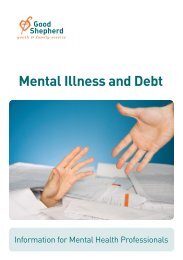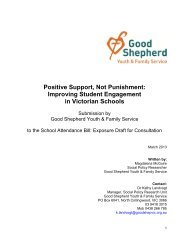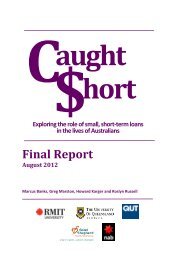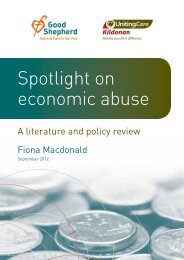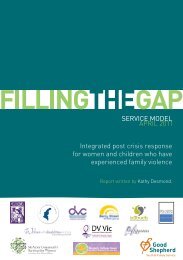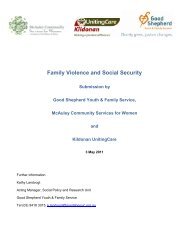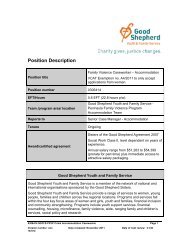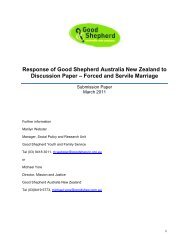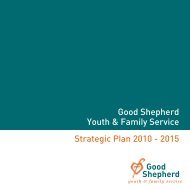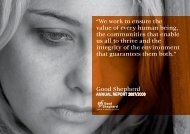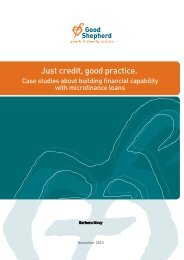Spotlight on economic abuse - Good Shepherd Youth & Family ...
Spotlight on economic abuse - Good Shepherd Youth & Family ...
Spotlight on economic abuse - Good Shepherd Youth & Family ...
Create successful ePaper yourself
Turn your PDF publications into a flip-book with our unique Google optimized e-Paper software.
a. DEEWR and Job Services Australia Guidelines, Advices and Job Aids;<br />
b. Fair Work Australia material;<br />
c. Fair Work Ombudsman material;<br />
d. Safe Work Australia Codes of Practice and other material; and<br />
e. other similar material. (ALRC 2011c, p. 11)<br />
The ALRC has also recommended that where relevant and appropriate, all Australian<br />
Prudential Regulati<strong>on</strong> Authority, Department of Human Services, Australian Taxati<strong>on</strong> Office<br />
and superannuati<strong>on</strong> fund material, should provide for a c<strong>on</strong>sistent definiti<strong>on</strong> of family<br />
violence in line with its guideline (ALRC 2011c, p. 11). At the time of writing it was not known<br />
whether any of these changes had been made.<br />
<strong>Family</strong> law<br />
Very recent changes to the Comm<strong>on</strong>wealth <strong>Family</strong> Law Act 1975 have seen a broadening of<br />
the definiti<strong>on</strong> of family violence in family law including the incorporati<strong>on</strong> of ec<strong>on</strong>omic <strong>abuse</strong>.<br />
<strong>Family</strong> violence is now defined as “violent, threatening or other behaviour by a pers<strong>on</strong> that<br />
coerces or c<strong>on</strong>trols a member of the pers<strong>on</strong>’s family (the family member), or causes the<br />
family member to be fearful” (<strong>Family</strong> Law Act 1975 s4AB). Examples of behaviour which<br />
may c<strong>on</strong>stitute family violence include the following:<br />
(g) unreas<strong>on</strong>ably denying the family member the financial aut<strong>on</strong>omy that he or<br />
she would otherwise have had; or<br />
h) unreas<strong>on</strong>ably withholding financial support needed to meet the reas<strong>on</strong>able<br />
living expenses of the family member, or his or her child, at a time when the<br />
family member is entirely or predominantly dependent <strong>on</strong> the pers<strong>on</strong> for<br />
financial support. (<strong>Family</strong> Law Act 1975 s4AB)<br />
<strong>Family</strong> law matters include separati<strong>on</strong> and divorce, relati<strong>on</strong>ships with children and property<br />
matters. While the ways in which family law systems and processes operate in all of these<br />
matters can have significance for women’s ec<strong>on</strong>omic outcomes, in relati<strong>on</strong> to ec<strong>on</strong>omic<br />
<strong>abuse</strong> the settlement of property is significant. Child support arrangements are also<br />
significant and some of the key issues with these were discussed in the previous secti<strong>on</strong><br />
c<strong>on</strong>cerned with policy issues. In relati<strong>on</strong> to property settlements two recent law reform<br />
reviews have recommended that the Australian Government “should initiate an inquiry into<br />
how family violence should be dealt with in respect of property proceedings under the <strong>Family</strong><br />
Law Act 1975 (Cth)” (ALRC 2011c, p. 630). Some of the issues relevant to ec<strong>on</strong>omic <strong>abuse</strong><br />
and property settlements are highlighted in the discussi<strong>on</strong> of superannuati<strong>on</strong> below.<br />
Superannuati<strong>on</strong><br />
Unequal participati<strong>on</strong> in employment—including the problem of gender pay inequity—places<br />
women at a disadvantage compared to men in regard to their financial wellbeing in<br />
retirement. For example, the Australian Institute of Superannuati<strong>on</strong> Trustees has estimated<br />
that the “median superannuati<strong>on</strong> balance for women aged between 55 and 64 years is<br />
$53,000, compared to $90,000 for men in the same age group” (de Silva & Harnath 2011, p.<br />
11).<br />
However, there are also some particular aspects of superannuati<strong>on</strong> arrangements and its<br />
regulati<strong>on</strong> that are specifically relevant to ec<strong>on</strong>omic <strong>abuse</strong>. The first of these c<strong>on</strong>cerns the<br />
possibility of loss of pers<strong>on</strong>al superannuati<strong>on</strong> through ec<strong>on</strong>omic <strong>abuse</strong> and the sec<strong>on</strong>d<br />
c<strong>on</strong>cerns the opti<strong>on</strong> for women to access their superannuati<strong>on</strong> early (that is, prior to<br />
retirement) when they may need m<strong>on</strong>ey <strong>on</strong> leaving an abusive relati<strong>on</strong>ship.<br />
41



